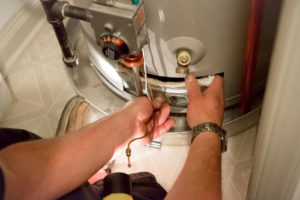
Hot water heaters are appliances that generally do not require attention- or so we think! While these appliances can do their job without much hassle, there is some maintenance that can be done to make these machines last longer and work more efficiently. Over time the tanks, untreated, work harder costing you more money when there are two things you can do to prevent this: have your tank serviced once a year and flush your tank periodically.
Draining Your Hot Water Heater
Sediments can build up in your hot water tank and calcify and eventually lead to their demise. Flushing your tank regularly will extend the life of your equipment and allow the heater to work better. Minerals such as limestone, magnesium, and calcium create “hard” water that creates sediment build-up. Natural gas heaters could heat unevenly which leads to leaks. Electric heaters, the sediment can burn up the heating element. Hot water heaters should be flushed every six months. If there is a higher volume of sediment, it should be flushed more frequently.
How to Flush Your Hot Water Heater
Before starting, turn off your gas hot water heater. Sometimes there is a vacation mode that will disable the tank temporarily. Determine if the pilot light should be lit manually- this information can be found in the owner’s manual or on occasion it will be written on the tank itself. After figuring this out it’s time to flush the tank.
- Step 1: In older homes, the main water supply may need to be turned off. Otherwise, turn the water supply to the hot water heater itself and if there is a water softener before the heater you can cut the water there.
- Step 2: The gas needs to be turned off before the tank is emptied- if the heating element comes on in the empty tank there could be damage. In conjunction with this, turn the water heater thermostat down.
- Step 3: Attach a garden hose to the tank’s drain valve. The opposite side should lead to a drain or outside a good distance from the home ensuring the water doesn’t leech back into the basement or crawl space. Another option to avoid the hot water is to turn the appliance off overnight and empty it in the morning or run the hot water for a few minutes before draining.
- Step 4: Open the drain valve and let it drain. Drain the tank faster by turning all the faucets in the home. Keep animals and children away from the draining water. Be sure to check to see the amount of sediment in the water. If when the drain is opened but water is not emptying the tank, the valve may be clogged in which case a wet/dry vacuum may be required. Clean this entirely while being careful to avoid getting burned by the hot water.
- Step 5: When the tank is drained, reopen the cold water flow to the tank wherever you turned it off. This will slush up the remaining sediment. Watch the hose to see when the water runs clear and then turn the water supply off again.
- Step 6: Disconnect the hose from the hot water heater valve. Clean the valve with the wet/dry vacuum and then close the drain valve. Turn the cold water supply on and leave the hot water faucets open in the home to prevent water from getting trapped. Allow the water to come clear, don’t worry if it takes a minute, and then turn the faucets off.
- Step 7: Turn the water heater back to its preferred setting. Reopen the gas supply if it was turned off and relight the pilot. Twenty or so minutes after the tank is filled there should be hot water.
Draining a Tankless Hot Water Heater
These instructions are for conventional water heaters. Tankless water heaters have a different flushing process but are still susceptible to sediment build-up. Tankless water heaters can be cleaned with a kit that is available at local hardware stores.
All of Your Plumbing Needs from Master Plumbing
Give Master Plumbing a call at (301) 650-9100, or contact us online to get more information on how our expert plumbers can help you with just about anything plumbing-related! We have received Angie’s List Super Service Award recognition for plumbing and drain cleaning every year since 2007, in addition to the Best Plumber award from Best of Bethesda. We are fully licensed, bonded, and insured, and our service is unparalleled. Give us a call today—you won’t regret it! To see examples of our projects, follow us on Facebook and Twitter!
